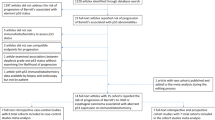Abstract
Background
Endoscopic polypectomy significantly reduces the incidence of colorectal cancer, but recurrence rates are high, especially for adenomas with advanced histology. The present guidelines recommend re-colonoscopy 3 to 5 years later. Due to limited resources, more precise predictions of adenoma recurrence are required.
Design
Lesions from 109 patients with colorectal adenomas recruited into a randomized, placebo-controlled chemoprevention trial with mesalazine were included. Formalin-fixed paraffin-embedded tissue sections were stained for ß-catenin, cyclooxygenase-2 (Cox-2), and p53 and scored. Adenoma recurrence rates were recorded after 3 years and associated with clinical and immunohistochemical parameters by contingency table analysis.
Results
After 3 years, adenomas recurred in 51.4 % of patients. Out of 109 adenomas, 95 met at least one criterion of advanced adenoma (size >1 cm, villous histology, high-grade intraepithelial neoplasia). There was no influence of age, sex, size or villous histology on adenoma reappearance, whilst the number of adenomas at baseline was positively associated with recurrence (p = 0.003). In contrast, ß-catenin nuclear localisation, Cox-2 expression and p53 nuclear expression were significantly associated with adenoma recurrence after 3 years (ß-catenin: p = 0.002; Cox-2: p = 0.001; p53: p = 0.001). Combining these three markers led to a negative predictive value of 88.5 % and a sensitivity of 94.6 %. (OR = 13.54)
Conclusions
Scoring each single parameter and, more strongly, the combination of all three parameters of the expression of ß-catenin, Cox-2 and p53 in colorectal adenoma tissue may be a useful negative predictor for adenoma recurrence in patients with advanced colorectal adenomas.



Similar content being viewed by others
References
Vogelstein B, Fearon ER, Hamilton SR et al (1988) Genetic alterations during colorectal-tumor development. N Engl J Med 319(9):525–532
Polakis P (1999) The oncogenic activation of beta-catenin. Curr Opin Genet Dev 9(1):15–21
Araki Y, Okamura S, Hussain SP et al (2003) Regulation of cyclooxygenase-2 expression by the Wnt and ras pathways. Cancer Res 63(3):728–734
Morrin M, Kelly M, Barrett N et al (1994) Mutations of Ki-ras and p53 genes in colorectal cancer and their prognostic significance. Gut 35:1627–1631
Poller DN, Hutchings CE, Galea M et al (1992) p53 protein expression in human breast carcinoma: relationship to expression of epidermal growth factor receptor, c-erbB-2 protein overexpression, and oestrogen receptor. Br J Cancer 66(3):583–588
Reiter RE, Anglard P, Liu S et al (1993) Chromosome 17p deletions and p53 mutations in renal cell carcinoma. Cancer Res 53(13):3092–3097
Winawer SJ, Zauber AG, Ho MN et al (1993) Prevention of colorectal cancer by colonoscopic polypectomy. The National Polyp Study Workgroup. N Engl J Med 329(27):1977–1981
Lieberman DA, Holub J, Eisen G et al (2005) Utilization of colonoscopy in the United States: results from a national consortium. Gastrointest Endosc 62(6):875–883
Bonithon-Kopp C, Piard F, Fenger C et al (2004) Colorectal adenoma characteristics as predictors of recurrence. Dis Colon Rectum 47(3):323–333
Ji JS, Choi KY, Lee WC et al (2004) Endoscopic and histopathologic predictors of recurrence of colorectal adenoma on lowering the miss rate. Korean J Intern Med 24(3):196–202
Winawer SJ, Zauber AG, Fletcher RH et al (2006) Guidelines for colonoscopy surveillance after polypectomy: a consensus update by US Multi-society Task Force on Colorectal Cancer and the American Cancer Society. CA Cancer J Clin 56(3):143–159
Schmiegel W, Pox CP, Reiser M (2004) Effect of 5-aminosalicylate (5-ASA) on colorectal adenoma recurrence. Gastroenterology 126(Supplement 2):A452
Takahashi M, Fukuda K, Sugimura T et al (1998) ß-catenin is frequently mutated and demonstrates altered cellular location in azoxymethane-induced rat colon tumors. Cancer Res 58:42–46
Wong SC, Lo ES, Lee KC et al (2004) Prognostic and diagnostic significance of beta-catenin nuclear immunostaining in colorectal cancer. Clin Cancer Res 10(4):1401–1408
Elder DJ, Baker JA, Banu NA et al (2002) Human colorectal adenomas demonstrate a size-dependent increase in epithelial cyclooxygenase-2 expression. J Pathol 198(4):428–434
Boccuzzi A, Terzolo M, Leonardo E et al (1995) High frequency of p53 expression in colo-rectal adenomatous polyps. Anticancer Res 15(4):1407–1410
Valizadeh A, Karayiannakis AJ, el-Hariry I et al (1997) Expression of E-cadherin-associated molecules (alpha-, beta-, and gamma-catenins and p120) in colorectal polyps. Am J Pathol 150(6):1977–1984
Sousa WA, Rodrigues LV, Silva RG Jr et al (2012) Immunohistochemical evaluation of p53 and Ki-67 proteins in colorectal adenomas. Arq Gastroenterol 49((1):35–40
Winawer S, Fletcher R, Rex D et al (2003) Colorectal cancer screening and surveillance: clinical guidelines and rationale—update based on new evidence. Gastroenterology 124(2):544–560
Schmiegel W, Reinacher-Schick A, Arnold D et al (2008) Update S3—guideline “colorectal cancer” 2008. Z Gastroenterol 46(8):799–840
Chung SJ, Kim YS, Yang SY et al (2011) Five-year risk for advanced colorectal neoplasia after initial colonoscopy according to the baseline risk stratification: a prospective study in 2452 asymptomatic Koreans. Gut 60(11):1537–1543
Martínez ME, Sampliner R, Marshall JR et al (2001) Adenoma characteristics as risk factors for recurrence of advanced adenomas. Gastroenterology 120(5):1077–1083
Martínez ME, Baron JA, Lieberman DA et al (2009) A pooled analysis of advanced colorectal neoplasia diagnoses after colonoscopic polypectomy. Gastroenterology 136(3):832–841
Acknowledgments
The study was supported by the PURE grant of the State of North-Rhine-Westfalia to AT and WS. We are also grateful to the Falk Foundation for supporting the GAPPS trial. We thank Dr. Frank Seidensticker for coordinating the GAPPS trial upon initiation, and we thank the biostatistician Dr. S. Lange, Witten, Germany, for supervising the statistical analysis.
Disclosures
The authors CPP, MR, DH, WS, ARS and AT have received honoraria for lectures from Falk Pharma GmbH. CPP, MR and WS have received research support from Falk Pharma GmbH.
Author information
Authors and Affiliations
Corresponding author
Additional information
Linda Brand and Johanna Munding contributed equally and should be considered co-first authors. Anke Reinacher-Schick and Andrea Tannapfel contributed equally and should be considered co-last authors
Rights and permissions
About this article
Cite this article
Brand, L., Munding, J., Pox, C.P. et al. ß-catenin, Cox-2 and p53 immunostaining in colorectal adenomas to predict recurrence after endoscopic polypectomy. Int J Colorectal Dis 28, 1091–1098 (2013). https://doi.org/10.1007/s00384-013-1667-z
Accepted:
Published:
Issue Date:
DOI: https://doi.org/10.1007/s00384-013-1667-z




